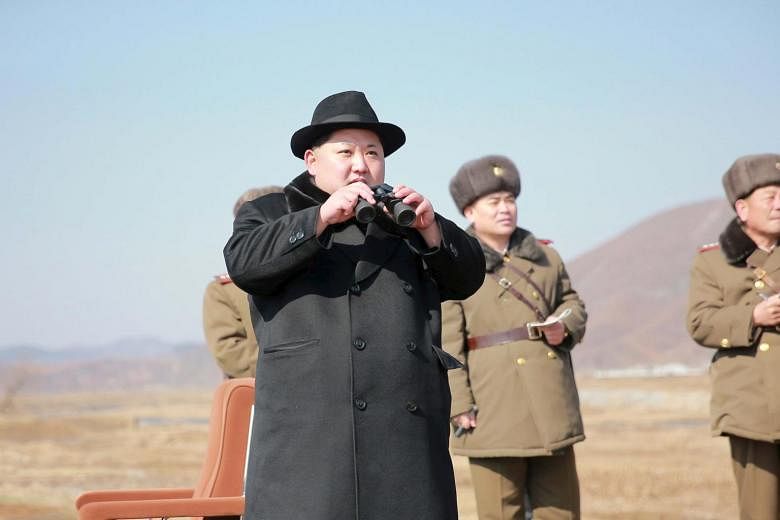SEOUL (AFP) - South Korea is fully prepared for North Korea to carry out a fifth nuclear test in defiance of tough UN sanctions imposed over its surprise fourth test in January, officials said Monday (March 21).
Military tensions have escalated sharply on the Korean peninsula in recent weeks, with North Korean leader Kim Jong Un threatening further tests and missile launches, partly in response to ongoing South Korea-US military exercises.
Last Friday, the North test-fired two medium range ballistic missiles, while a US think-tank said recent satellite images showed activity at the North's main nuclear test site that suggest a further underground detonation could take place "any time".
The South's Unification Ministry, which is responsible for inter-Korean affairs, said it had reached a similar conclusion. "We believe that a fifth nuclear test can take place right away. The government is preparing for all possibilities," said ministry spokesman Jeong Joon Hee.
The Defence Ministry also reiterated its previous assessment that the North was ready to carry out another test as soon as the order was made by the leadership.
"In this regard, our military, along with intelligence authorities in South Korea and the United States, are thoroughly monitoring such movements," said ministry spokesman Moon Sang Gyun.
The North's nuclear test on Jan 6 was followed the next month by a satellite rocket launch that was widely seen as a disguised ballistic missile test.
The UN Security Council responded with the toughest sanctions imposed to date over the North's nuclear programme, while Seoul and Washington pushed ahead with their annual military exercises.
Since the drills began, Pyongyang has delivered a near daily barrage of angry warnings, including threats of pre-emptive nuclear strikes against the South and the US mainland.
The missiles launched on Friday were the North's first medium-range tests for two years.
They came days after Mr Kim Jong Un announced that a nuclear warhead explosion test and firings of several kinds of ballistic missiles would be carried out "in a short time".
In a meeting with senior aides on Monday, South Korean President Park Geun Hye said this was a "very crucial time" for the Korean peninsula. "Even after the international community adopted strong sanctions, North Korea continues to attempt reckless provocations as shown through Kim Jong-Un's recent order," Ms Park said.
Meanwhile on Monday, South Korean activists said they planned to launch millions of anti-Pyongyang leaflets into North Korea, a move likely to escalate already elevated tensions on the divided peninsula.
Conservative activists, including many North Korean defectors, have been carrying out leafleting exercises using giant helium balloons for years - a practice that infuriates Pyongyang which has threatened military strikes in response.
In October 2014, North Korean frontier guards attempted to shoot down a set of balloons, triggering a brief exchange of fire across the border.
Defector-turned-activist Park Sang Hak said the planned launch would take place on March 26 at Imjingak, a park located in the border city of Paju.
"We will fly 10 million propaganda leaflets criticising Kim Jong Un's severe violation of human rights," Mr Park said in a statement.
The event is to coincide with Saturday's anniversary of the sinking of a South Korean warship in 2010, with the loss of 46 sailors. Seoul pinned the blame on the North and froze trade and investment ties.
The South Korean government says the activists have a right to carry out leaflet launches, although it has, in the past, used police to block such exercises during moments of heightened inter-Korean tension.
The Unification Ministry said officials would have to consider whether a leaflet launch in the present atmosphere might trigger a North Korean response that would "threaten the lives and property of our citizens".
Following North Korea's fourth nuclear test on Jan 6, South Korea resumed blasting a mix of K-pop and propaganda messages into the North, using giant banks of speakers on the heavily militarised border.
North Korea has responded by dropping its own leaflets over the border, attacking President Park.

